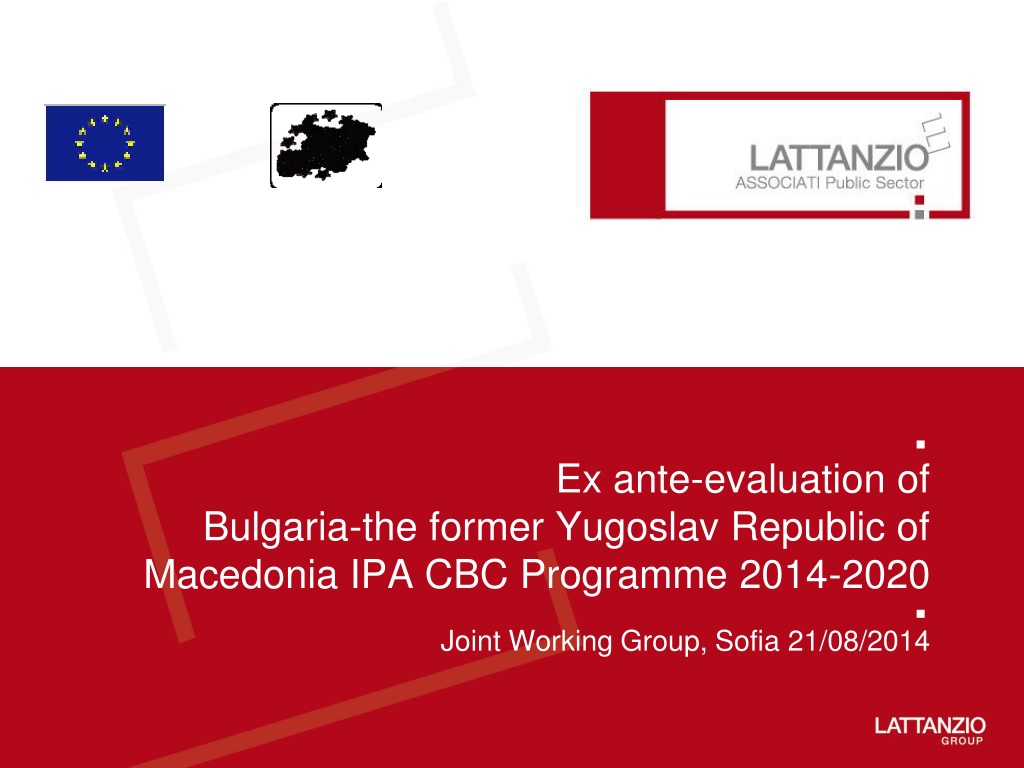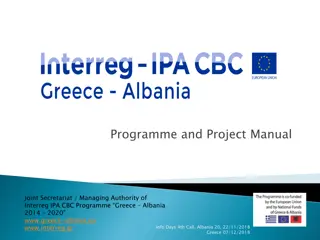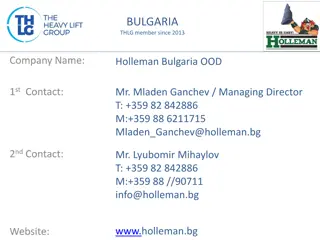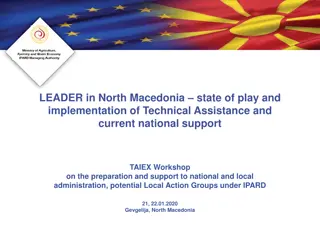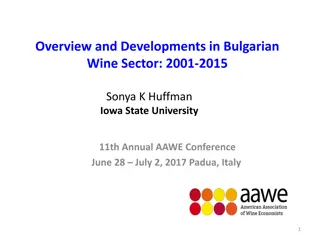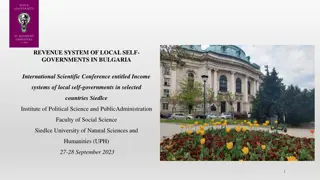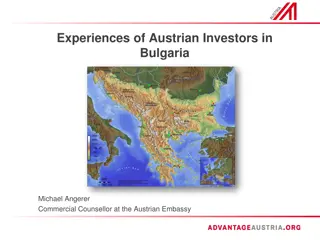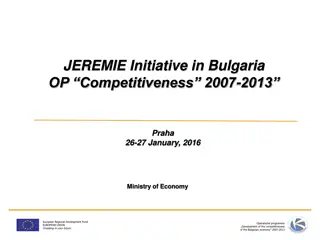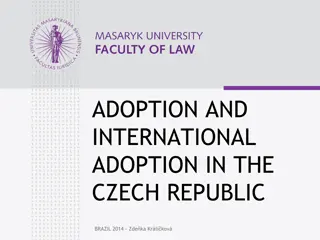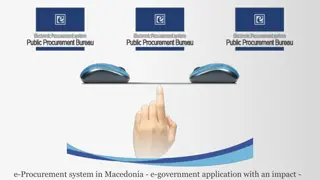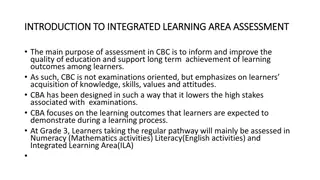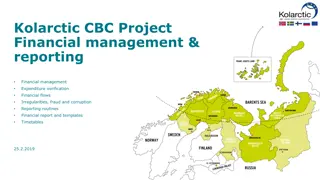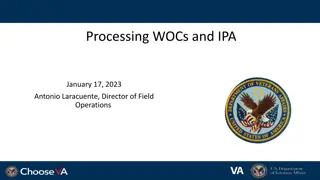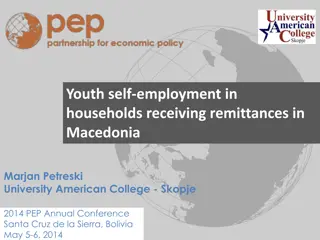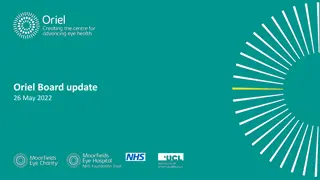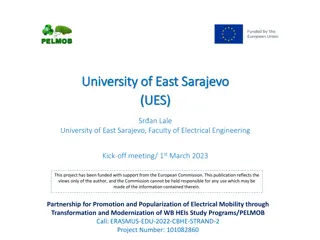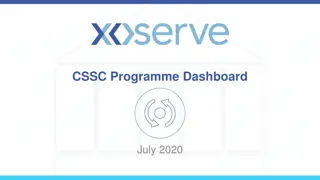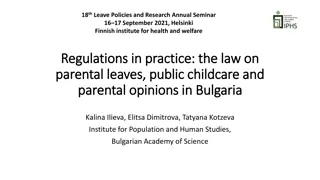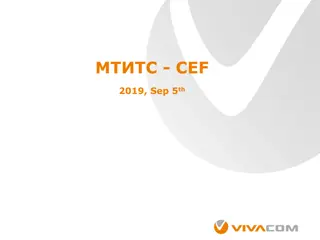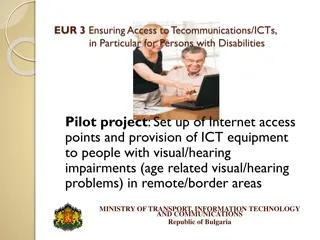Ex-ante Evaluation of Bulgaria-The Former Yugoslav Republic of Macedonia IPA CBC Programme 2014-2020
This document outlines the ex-ante evaluation process for the Bulgaria-The Former Yugoslav Republic of Macedonia IPA CBC Programme 2014-2020. It covers key phases, strategic environmental assessment, stakeholder involvement, lessons learned from past programming, program design, findings regarding the program strategy, and collaborative efforts with relevant stakeholders and authorities. The evaluation emphasizes the iterative nature of the process and the importance of timely feedback for cognitive needs.
Download Presentation

Please find below an Image/Link to download the presentation.
The content on the website is provided AS IS for your information and personal use only. It may not be sold, licensed, or shared on other websites without obtaining consent from the author. Download presentation by click this link. If you encounter any issues during the download, it is possible that the publisher has removed the file from their server.
E N D
Presentation Transcript
Ex ante-evaluation of Bulgaria-the former Yugoslav Republic of Macedonia IPA CBC Programme 2014-2020 Joint Working Group, Sofia 21/08/2014
Ex-ante evaluations main phases and deliverables Contract signature and kick- off meeting Draft Final Report Final Report 1 Draft Indicators Report Inception Report End of June 2014 Beginning of June 2014 End of July 2014 May 2014 May 2014 2
Strategic Environmental Assessment (SEA) s main phases and deliverables Contract signature and kick- off meeting Consultat ions on Scoping Report Environm ental Report Scoping Report Inception Report June 2014 Beginning of June 2014 July 2014 May 2014 May 2014 3
Ex-ante evaluation as an iterative process Tight cooperation with programming authorities Relevant stakeholders Managing Authority Timely feedbacks to fit cognitive needs Ex-ante Evaluator Judgments and recommendations Joint Working Group Programming team 4
Designing the Bulgaria-the former Yugoslav Republic of Macedonia IPA CBC Programme 2014-2020 Involvement of stakeholders: Develop strategies actions adhering needs and demands Strengthening a sense of collective ownership of Community Policies Participatory pathway wide participation stakeholders (Main surveys, Regional Consultative Forum, on-line consultations (versions 1.0 and 2.0) Stakeholders outcomes and tackling methods On-line instruments events during implementation Lessons learnt from 2007-2013 programming: Strategy is backed by a sound and well-grounded socio-economic analysis Clear demarcation between spheres of interventions and between Priority axes to be ensured A border region tourism strategy which outlines destinations and services for tourism development Soft measures and investments are well balanced Horizontal principles duly considered programming and will be developed during OP s life-cycle More tailored indicators, including baseline and target values, also broken down in categories where possible and cross-border propose to enabling cross-border steps: a of on-line on Draft OP about informed and periodic Programme and accountable methods for 5
Ex-ante evaluation main findings: Programme strategy 1/2 6
Ex-ante evaluation main findings: Programme strategy 2/2 7
Ex-ante evaluation main findings: Horizontal principles Programme implementation Programming phase Horizontal principles duly taken into consideration in preparatory works and Participatory pathway Dialogue with the Ex ante Evaluator Horizontal principles will be taken into account in the quality assessment for project selection Monitor horizontal principles at programme and project level Breakdown indicators (where possible) 8
Ex-ante evaluation main findings: Financial allocation Financial weighting took into account lessons learned and needs assessment Financial allocation seems to be coherent, balanced and appropriate Financial breakdown per Priority is consistent with identified challenges and needs 9
Ex-ante evaluation main findings: Indicators, monitoring and evaluation 1/2 Indicators The choice of foreseeing one Result Indicator (RI) for each expected result is sharable, though they must prove not to be overambitious The S.M.A.R.T. analysis proved result and output indicators suitability to monitor and verify Programme s achievements. Nonetheless, some rooms Baseline and target value Programme specific result indicators baseline values established where possible on past experience and budget, others to be established through ad hoc surveys Output indicators target values have been established paying attention to envisaged activities, past experience and budget allocation Need for further clarification on methods for calculating targets Definition of Strategic Projects (and related requirements, scope and budget) essential for fine tuning the targets 1 0
Ex-ante evaluation main findings: Indicators, monitoring and evaluation 2/2 Administrative capacity The functions and responsibilities of the bodies in charge of the management system are in line with the regulatory framework and well described The indicative list of members of the JMC identify which are the institutions and organizations which will take part in the work of this body, though it must be completed These adjustments should lead to the simplification of the JMC The Programme may involve advisory bodies in the work of the JMC Collection of data and evaluation The arrangements for the management and control system are explained in detail and are well structured, with a delimitation between institutional and procedural parts More detailed/clearer criteria still need to be identified for selecting Strategic Projects 1 1
Ex-ante Evaluations main recommendations on Draft Final OP (version 3.2 August 2014) Procedural improvement Lessons learnt from 2007-2013 Clarify synergies between SOs related to competitiveness during the implementation Programme strategy Using project forms to monitor implementation & cross cutting issues Indicators, monitoring and evaluation Describe functions of JTS so as to enable its simplification Administrative capacity 1 2
Strategic Environmental Assessment (SEA) Objectives Assessing possible impacts on the environment of the Bulgaria-Turkey IPA CBC Programme 2014-2020 (Directive 2001/42/EC and national legislation), taking into account cross- border nature of proposed intervention Providing a qualitative description on the positive and possible negative effects on the environment at SO level Drawing recommendations to prevent and reduce and as fully as possible any significant adverse effects during the implementation the Programme Methodology Iterative process with programming team and cooperation with Ex-ante Evaluator Literary review of EC guidance documents and reports on the application of the SEA Directive as well as national specific legislation, manuals and guidelines developed by Bulgaria and Turkey Analysis on Draft OP Main steps Scoping Report Consultations on Scoping Report (June 2014) Draft Environmental Report Consultations of the Draft of the Environmental Report (underway) SEA (to be annexed to OP) 1 3
THANKS FOR YOUR ATTENTION! Vincenzo Angrisani angrisani@lattanziogroup.eu Virgilio Buscemi buscemi@lattanziogroup.eu Francesca Solca solca@lattanziogroup.eu Federico Benvenuti benvenuti@lattanziogroup.eu
LATTANZIO GROUP Head Office Via Nazionale, 89A 00814 Roma (Italia) Tel. +39 06 58300195 fax +39 06 5813174 www.lattanziogroup.eu info@lattanziogroup.eu
